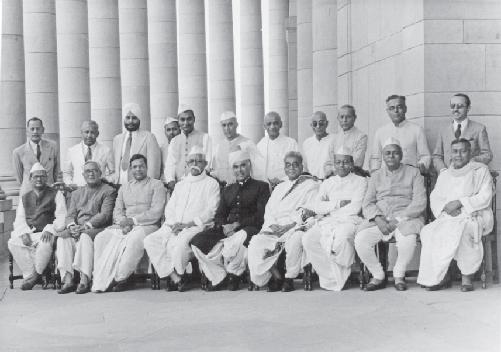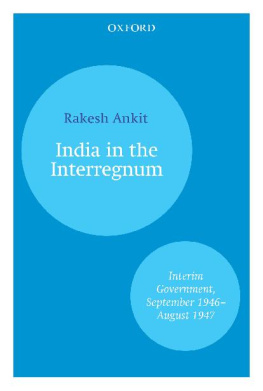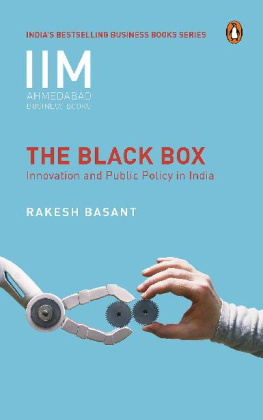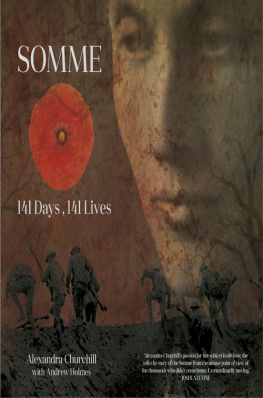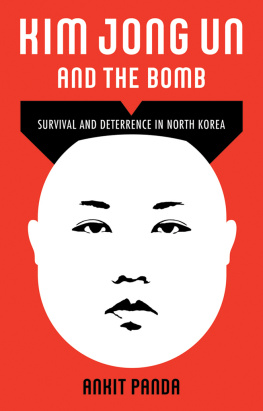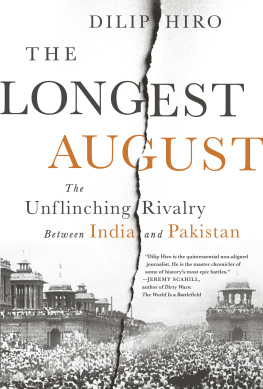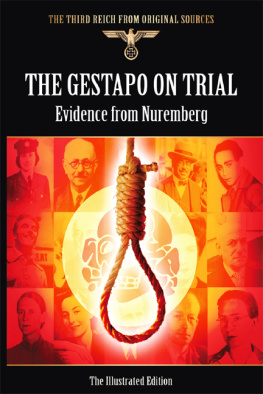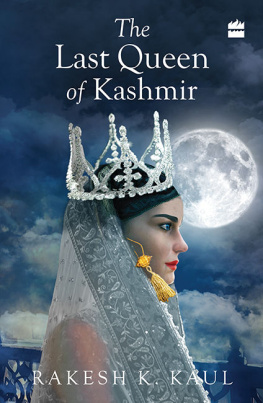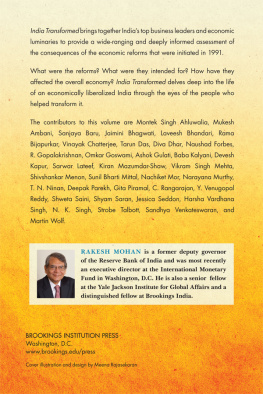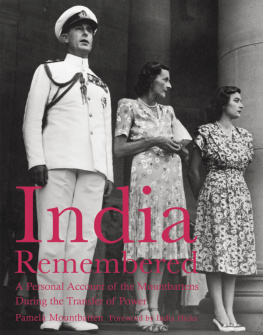India in the Interregnum
Congress Provincial Premiers with members of Interim Government.
Seated (L to R): S.K. Singh, Dr Khan Sahib, H.K. Mahtab, R.S. Shukla, Sir Muzaffar Ali (Punjab), T. Prakasam, B.G. Kher, G.B. Pant, G.N. Bardoloi
Standing (L to R): Sir Shafaat Ahmad Khan, Dr John Matthai, Baldev Singh, K.B. Sahay, Rajendra Prasad, J.L. Nehru, V.B. Patel, C. Rajagopalachari, Asaf Ali, Syed Ali Zaheer, C.H. Bhabha
Source : Album 623, no. 27958, at the photo section of Nehru Memorial Museum and Library, New Delhi.
All attempts were made to contact the copyright holders of this image. In case of any omissions, please contact Oxford University Press, India, so that necessary acknowledgements and corrections may be made in the subsequent editions of this book.
India in the Interregnum
Interim Government, September 1946August 1947
Rakesh Ankit
Oxford University Press is a department of the University of Oxford.
It furthers the Universitys objective of excellence in research, scholarship,
and education by publishing worldwide. Oxford is a registered trademark of
Oxford University Press in the UK and in certain other countries.
Published in India by
Oxford University Press
2/11 Ground Floor, Ansari Road, Daryaganj, New Delhi 110 002, India
Oxford University Press 2019
The moral rights of the author have been asserted.
First Edition published in 2019
All rights reserved. No part of this publication may be reproduced, stored in
a retrieval system, or transmitted, in any form or by any means, without the
prior permission in writing of Oxford University Press, or as expressly permitted
by law, by licence, or under terms agreed with the appropriate reprographics
rights organization. Enquiries concerning reproduction outside the scope of the
above should be sent to the Rights Department, Oxford University Press, at the
address above.
You must not circulate this work in any other form
and you must impose this same condition on any acquirer.
ISBN-13 (print edition): 978-0-19-948968-8
ISBN-10 (print edition): 0-19-948968-8
ISBN-13 (eBook): 978-0-19-909560-5
ISBN-10 (eBook): 0-19-909560-4
Typeset in Adobe Jenson Pro 10.7/13.1
by Tranistics Data Technologies, New Delhi 110 044
Printed in India by Replika Press Pvt. Ltd
Contents
This book first took form towards the end of my doctoral dissertation, submitted to the University of Southampton in 2014, and I am grateful to Professor Ian Talbot, my research supervisor, for his kind encouragement then and unstinting support since. My gratitude to Dr Salma Siddique, fellow-traveller of the 1940s, to whom, I owe the inception of the idea. At Southampton, I also extend my appreciation to Professor Chris Woolgar for his insightful guidance among the Mountbatten Papers.
The book is based on research done in archives and libraries in England and India and I am thankful to their staff, especially to the kind and caring Jyoti Luthra and Soumya Mohanty at the Nehru Memorial Museum and Library (NMML), New Delhi. It was received promptly at the Oxford University Press, accepted with reassuring comments by the two anonymous reviewers and refined meticulously by the editorial team there. Professor Mahesh Rangarajan gave a kind opportunity to talk about it at NMML, which enthused me greatly. The talk was chaired by Professor Madhavan Palat and I remain obliged. Before that, Dr Srinath Raghavan at the Centre for Policy Research, and since then, Professor Sunil Khilnani from the Kings India Institute, were similarly solicitous.
Much of the book was written at O.P. Jindal Global Law School, Sonipat, India, where I am indebted to Wajahat Ahmad, Aaliya Anjum, Krithika Ashok, Sannoy Das, and Amit Bindal for their sustaining and inspiring friendships. It was finished during a visiting CSMCH-IASH fellowship at the Institute for Advanced Studies in the Humanities (IASH), Edinburgh, UK, and I thank Dr Talat Ahmed, Dr Emile Chabal, and Dr Ben Fletcher-Watson for the opportunity.
In Delhi, Atishi Marlena, Chitra Mishra, Aditi Bhardwaj, Ravish Tiwari, Pujya Trivedi, Rohit Wellington, Professor Indivar Kamtekar, and Dr David Baker strengthened me with their affection and advice. From Mumbai, Aditya Basu sent solace, from Sangareddy, my sister and brother-in-law wished luck, from Minneapolis, my aunt held hope, and from Coventry, Dr Pippa Virdee helped put the book to rest; much to my relief and that of my parents, especially my mother. This book is for them.
My doctoral research was on the early international dimensions of the Kashmir dispute between India and Pakistan, against the twin backdrops of the end of empire and the beginning of the Cold War. Employing these prisms, it looked at the evolution of this regional episode involving an erstwhile princely state into a subcontinental saga of undeclared war and diplomacy. It covered the two-decade period from 1945 to 1966, but towards the end of my research and through the course of writing my thesis, I was constantly struck by the strange amalgamation of individuals and institutions, structures and processes, and networks and agents, which populated the India of late 1940s and amidst whom the dispute emerged and evolved.
In particular, the aptly titled and peculiarly constituted Interim Government, in office from 2 September 1946, and its eleven provincial counterparts, in office from spring 1946, seemed to determine many aspects of both the epilogue to the Empire and the prologue to partition/independence of British India. Participated in by the major Indian political parties and propped up by the British state civil, police, and military apparatus, this miscellany of ideologically diverse, adversarial groups seemed ripe and relevant for an excavation. Oddly overlooked by the historiography of the period, given that this interregnum was overshadowed by what came before and after, its liminal image appeared to me as twice more important: first, as reflecting the afterlife of imperial India and second, as representing the precursor of independent India. The eleven months from September 1946 to August 1947, in my realization, were packed with critical elements of the formal exit of the empire alongside the imperial durabilities as well as the vital signs of the coming Partition and its aftermath.
Recent writings on Partition have increasingly become fittingly people-oriented, as against the earlier preferences for politics, processes, personalities, and policies. Nineteen forty-seven was, all said and done, a peoples tragedy, and attempts are being made, with renewed vigour, to probe, elucidate, document, exhibit, archive, and memorialize individual stories of voluntary and involuntary participation in that tide of affairs. Given this historiographical turn, the governmental arrangement that framed this period of transition is in danger of being almost entirely forgotten on all sides: British, Indian, and Pakistani. The incredibly diverse participants, both those who went on to have alternative public careers as well as those who did not, their life and work then has been overlain by later narratives.
